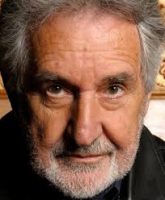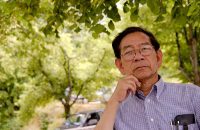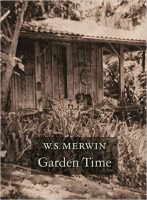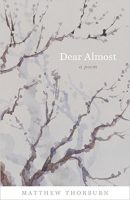September 15, 2016
Edited by David Sanders
Specimen Days
1887—Jean/Hans Arp, French/Swiss sculptor, artist and poet, is born.
1898—John J Slauerhoff, Dutch ship's doctor/writer/poet (El Dorado), is born.
1924—Lucebert, Dutch poet/painter/cartoonist (Boozz, PC Hooft prize 1967), is born.
1939—Breyten Breytenbach, South African poet/painter, is born.

when the blinding comes,
the discomposure of silence,
it must be high up the hills
where hundreds of poor
stamp their feet in the dust, and drums
and woman voices like this ululating skyline
gag the final ecstasy
—from “Today I went Down” by Breyten Breytenbach
“it must be high up the hills / where hundreds of poor / stamp their feet in the dust” —Breyten Breytenbach
World Poetry
Digital India Tweet Praises Poem Calling on Army to Kill Kashmiris, Minister Takes Action
The official handle of Digital India, a flagship government initiative for a digitally empowered society and knowledge economy, on Thursday tweeted a poem promoting the killing of Kashmiris by the Army. The tweet, which was soon deleted, included the screenshot of a poem posted on Facebook that it labelled “Heights of #Patriotism..!!!” Managed by the Ministry of Electronics and Information Technology, Digital India has more than 5.34 lakh followers on Twitter.
Digital India, a government initiative for a digitally empowered society, tweeted a poem promoting the killing of Kashmiris.
Recent Reviews
A Poet With an Ear for the World Around Her
by Stephen Burt
“Please take a piece of me back home,” Bernadette Mayer requests; “give everybody / everything.” Mayer’s poetic career embodies that generous impulse: Most of her 20-odd books and collaborations show by effusive, charming, sometimes hyperbolic example how to reject any model of poetry that requires perfection and uptight isolation. Instead, her unrhymed sonnets, her seemingly slapdash odes, her versified diary entries let her, and her readers, live in the moment, opening us up to other people’s cares and joys and wishes and words, in the New York City art scene where she began and in the greener parts of New York State — “Albany and Rensselaer counties” — that provide her territory now.
A Forensic Poet for Our Time
by John Yau

What do you do, if you are a poet who has never “ been comfortable with autobiographical material?” Monica Youn’s poems brim with answers to this question that a younger poet might do well to notice. In her recent book, Blackacre: Poems, she refracts the particulars of her life through different prisms: Francois Villon’s “Ballade des Pendus” (“Ballad of the Hanged Men”), in which a group of hanged men speak in a collective voice; the next-to-last shot in Michelangelo Antonioni’s The Passenger (1975), starring Jack Nicholson and Maria Schneider; John Milton’s “Sonnet 19 (On his Blindness).” Executed by hanging, assuming a dead man’s identity, or going blind – many of the figures Youn focuses on exist in an extreme state, fundamentally cut off from others.
What if you’re a poet who has never “been comfortable with autobiographical material?” Monica Youn’s poems answer this question.
Broadsides
Wandering Pathways, Scrabbling Claws
By Stephen Burt
Peterson has spent most of his life so far as a painter and as a teacher of painting: From 1974 to 2005 he taught and ran a gallery at Pensacola State College in northwest Florida. For most of that time he was writing and rewriting poems: All his six full-length books came out after 2000. These lines from his first full-length collection, Anonymous Or (2001)—there have been four since—say how he sees the world: literally how he sees it with his eyes, and also how he interprets the words, inscriptions, epigraphs, that attach themselves, like epiphytes, to its nonverbal images. The same lines say how he interprets the further evidence of hearing and proprioception, and the theories that come to us from the natural sciences, which begin from observations like those Peterson makes on Florida’s Gulf Coast
Pound, Yip, & Chinese Poetry in America
by Jerome Rothenberg

It is almost pro forma, in talking of Ezra Pound and Chinese poetry, that we go back to T.S. Eliot’s remark that “Pound is the inventor of Chinese poetry for our time.” Hugh Kenner does it. Wai-lim Yip does it. It is a statement that rings true, once one allows that Eliot was making it with tongue securely in cheek and looking for the maximum effect. It is also a two-fold statement, balanced in an obvious way between “inventor of Chinese poetry” and “for our time.” And yet, curiously, Wai-lim Yip omits the second part (“in our time”) when he first quotes Eliot in Pound’s Cathay, and Kenner, with more tongue and more cheek than Eliot, condenses it in the title of the pertinent chapter in his book The Pound Era, to read simply “The Invention of China.” (Reading that last one, here, in China, is something of an embarrassment – but only if you miss the irony that lies behind it.)
In talking of Ezra Pound and Chinese poetry, we often go back to Eliot’s remark that “Pound is the inventor of Chinese poetry for our time.”
Drafts & Fragments
The 10 Poetry Contenders for the 2016 National Book Award
The National Book Foundation has announced the 10-title longlist for the 2016 National Book Award for poetry. The list will be narrowed to five finalists in October, and the prizes will be awarded Nov. 16 in New York.
The National Book Foundation has announced the 10-title longlist for the 2016 National Book Award for poetry.
Poetry In the News
Poet Sharon Olds wins $100,000 Academy of American Poets Prize
Pulitzer Prize-winning US poet Sharon Olds has been given a $100,000 (£75,000) lifetime achievement award. Olds, 73, was given the Academy of American Poets' prestigious Wallace Stevens Award for "proven mastery in the art of poetry". It comes three years after she received the Pulitzer for Stag's Leap, a sequence of poems about a divorce. Ex-Pulitzer winner and former US poet laureate Natasha Trethewey was awarded $25,000 (£18,700) and a fellowship.
First Lady Calls Out Young Poet At White House Event

First Lady Michelle Obama gave a shout-out to an Indian-American student, one of two from the community, to be recognized in the 2016 National Student Poets Program, a national competition that celebrated the winners at the White House Sept. 8.
Poet Rupi Kaur's Milk and Honey Sells More than Half a Million Copies
The “Instapoet” Rupi Kaur’s originally self-published collection Milk and Honey has sold more than half a million copies in the US and is into its 16th printing, according to its publisher.
Michelle Obama recently recognized young poets at the White House for their involvement in the 2016 National Student Poets Porgram.
New Books
Garden Time by W. S. Merwin
[Hardcover] Copper Canyon Press, 96 pp., $24.00

W.S. Merwin composed Garden Time during the difficult process of losing his eyesight. When he could no longer see well enough to write, he dictated his new poems to his wife, Paula. In this gorgeous, mindful, and life-affirming book, our greatest poet channels energy from animated sounds and memories to remind us that "the only hope is to be the daylight."
The Mansion of Happiness by Jon Loomis
[Paperback] Oberlin, 68 pp., $16.95
Alien abduction, reincarnation, earthquake, love, death, middle age, children, the end of the world—Jon Loomis’s new collection covers a lot of ground. From the quiet and contemplative lyric voice of “The Past” and “If I Come Back” to the wild, unrepentant personae of “Jon Loomis, Inc.” and “Shut Up and Eat Your Jellyfish,” these are poems as necessary as they are brave. The Mansion of Happiness is a love song to the teetering present, facing an ominous future with courage, candor, and mordant humor.
América invertida: An Anthology of Emerging Uruguayan Poets edited by Jesse Lee Kercheval
[Paperback] University of New Mexico Press, 304 pp., $24.95

América invertida introduces twenty-two Uruguayan poets under the age of forty to English-speaking audiences for the first time. Kercheval paired poets and translators to produce a rich volume based on a multicultural dialogue about poetry and the written word. América invertida presents Spanish poems and their English translations side by side to give readers an introduction to Uruguay’s vibrant literary scene.
Untrussed: Poems by Christine Stewart-Nuñez
[Paperback] University of New Mexico Press, 88 pp., $17.95
Stewart-Nuñez draws upon a number of styles―persona, ekphrastic, lyrical, formal―to create a collection that explores the promises of love and loss. Among Untrussed’s many delights is a series of Wonder Woman poems that reveal a heroine who is as human as she is superhuman. From pleasure to pain to hope of new love, this collection draws readers into the everyday magic of the world.
Dear Almost: A Poem by Matthew Thorburn
[Paperback] LSU Press,88 pp., $17.95

Dear Almost is a book-length poem addressed to an unborn child lost in miscarriage. Beginning with the hope and promise of springtime, poet Matthew Thorburn traces the course of a year with sections set in each of the four seasons. Part book of days, part meditative prayer, part travelogue, the poem details a would-be father’s wanderings through the figurative landscapes of memory and imagination as well as the literal landscapes of the Bronx, Shanghai, suburban New Jersey, and the Japanese island of Miyajima.
Odes by Sharon Olds
[Hardcover] Knopf, 128 pp., $26.95
Following the Pulitzer prize-winning collection Stag’s Leap, Sharon Olds gives us a stunning book of odes. Opening with the powerful and tender “Ode to the Hymen,” Olds addresses and embodies, in this age-old poetic form, many aspects of love and gender and sexual politics in a collection that is centered on the body and its structures and pleasures. The poems extend parts of her narrative as a daughter, mother, wife, lover, friend, and poet of conscience that will be familiar from earlier collections, each episode and memory burnished by the wisdom and grace and humor of looking back. In such poems as “Ode to My Sister,” “Ode of Broken Loyalty,” “Ode to My Whiteness,” “Blow Job Ode,” and “Ode to the Last Thirty-Eight Trees in New York City Visible from This Window,” Olds treats us to an intimate examination that, like all her work, is universal, by turns searing and charming in its honesty. From the bodily joys and sorrows of childhood to the deaths of those dearest to us, Olds shapes the world in language that is startlingly fresh, profound in its conclusions, and life-giving for the reader.
América invertida introduces twenty-two Uruguayan poets under the age of forty to English-speaking audiences for the first time.
Correspondences
Hera Lindsay Bird: I prefer poetry that allows room for ugliness and error
The New Zealander has become a cult favourite for her explicit, cutting and often funny writing. But, she says, you can’t judge poems by page views
by Eleanor Ainge Roy

It’s a midwinter Monday night and Hera Lindsay Bird – New Zealand’s most exciting young poet – is tucked up in bed in pyjamas and a robe her boyfriend calls “too Laura Ashley for human consumption”. Her first book of poetry – a provocative, raunchy bestseller – was published in July by Victoria University Press and a reprint has already been ordered.
The Anger and Joy of a Native-American Poet in Brooklyn
by Peter Moskowitz
On a particularly hot day this August, Tommy Pico explained his approach to the work of poetry. A book-length poem he wrote, “IRL,” will come out in September, and he had been giving readings and planning events. Pico grew up on the Viejas Reservation, near San Diego. His dad was a chairman of the reservation and often told his son that he was good at his job because he didn’t like it. This is how Pico now feels about being a poet. “That’s why I’m good at reading,” Pico told me, as we rode the train from a hair appointment to his apartment, in Bushwick. “I don’t want to be the one onstage, but that’s part of the job.”
New Zealand’s Hera Linsday Bird prefers poetry that allows room for ugliness and error.
Envoi: Editor’s Notes
Well, it's not quite October; nonetheless, the woodland paths are dry. So given that, here is "The Wild Swans at Coole" By W. B. Yeats, written 100 years ago.
The Wild Swans at Coole
The trees are in their autumn beauty,
The woodland paths are dry,
Under the October twilight the water
Mirrors a still sky;
Upon the brimming water among the stones
Are nine-and-fifty swans.
The nineteenth autumn has come upon me
Since I first made my count;
I saw, before I had well finished,
All suddenly mount
And scatter wheeling in great broken rings
Upon their clamorous wings.
I have looked upon those brilliant creatures,
And now my heart is sore.
All's changed since I, hearing at twilight,
The first time on this shore,
The bell-beat of their wings above my head,
Trod with a lighter tread.
Unwearied still, lover by lover,
They paddle in the cold
Companionable streams or climb the air;
Their hearts have not grown old;
Passion or conquest, wander where they will,
Attend upon them still.
But now they drift on the still water,
Mysterious, beautiful;
Among what rushes will they build,
By what lake's edge or pool
Delight men's eyes when I awake some day
To find they have flown away?